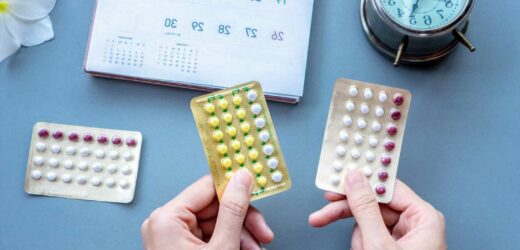CHOOSING contraception can be tricky, with so many potential side effects to consider for each.
While many are unpleasant, such as moodiness or bleeding, you may not feel so down about bigger boobs.
Two of the most commonly reported side effects across all contraceptives are tender breasts and enlarged breasts, according to The Lowdown – an online review platform for contraception.
You’re more likely to see your breasts balloon on hormonal contraceptives, experts say, the main one being the combined pill.
Hormonal contraceptives work by releasing the hormones that change the body's chemistry to prevent pregnancy.
These hormones act the same way as the body’s natural ones, which breast tissue may respond to.
Read more on women’s health
Thousands of women with breast cancer could benefit from new NHS-approved pill
I’m a pharmacist and these conditions could affect you down there this summer
Dr Becky Mawson, Clinical Lead at The Lowdown, said changes to breast tissue is not permanent.
She said: “All hormonal methods can cause breasts to change and become heavier, fuller, lumpier or more uncomfortable.
“This typically happens when you first start using a hormonal contraceptive and usually settles after a few months.
“This is more likely to happen if you are someone who gets breast pain or discomfort during your usual monthly hormone cycle as your breasts may be more sensitive to change in female hormones.”
Most read in News Health
HIGH ALERT Warning as Victorian disease kills one person after outbreak at uni
My dad brushes my hair because I'm now too weak, reveals Dame Deborah James
My dad is unsung hero – he's always been there to prop me up, says Deborah James
I'm a nutrition expert – here's 9 foods that are healthier if you COOK them
Dr Mawson said breast tissue is “very sensitive to female hormones which are found in hormonal contraception”.
“Adding extra hormones into your body, even the very small amounts with contraception, can cause changes in the breast tissue,” she said.
The main offenders
The Lowdown says if breasts do enlarge, it’s due to water retention triggered by the hormones.
Oestrogen is known to cause fluid retention, while progestogen is thought to have the opposite effect.
Therefore, progestogen-only contraceptives are less likely to plump the chest than those that combine oestrogen and progestogen.
The combined pill, patch and vaginal ring all release doses of both oestrogen and progestogen.
However progestogen-only birth controls include the Nexplanon implant and progestogen injections (Depo Provera and Sayana Press).
The mini-pill only contains progestogen, and includes Micronor, Noriday, Norgeston, Cerazette, Aizea, Cerelle and Feanolla.
The implant (IUS) only contains progestogen.
Progestogen-only contraception is linked to an increased chance of getting small cysts in the breast, Dr Mawson said.
These are harmless but should be checked out by your healthcare team.
Dr Mawson added: “Breast cancer risk in people under 40 is very rare but if you find a lump in the breast, we always recommend getting it checked out at your general practice.
“Get used to the feel of your breast so you can pick up on any changes over time.”
Non-hormonal contraceptives include the copper coil intrauterine device (IUD), which releases copper into the womb, diaphragms and condoms.
It’s unlikely you’ll see a change in the breasts or weight using these methods compared to the hormonal types.
Weighty issue
Alongside changing breasts, weight gain is another body change that you might experience when using contraception.
Dr Mawson said: “In my experience, all hormonal methods can potentially lead to changes in weight and body composition.
“Contraceptive hormones can make you more bloated and retain fluid, you also might feel hungrier which can lead to more calorie intake.”
Dr Mawson said regardless of your contraception choice, there are many reasons for weight gain, including over a woman’s lifetime.
She said: “Gaining weight with hormonal contraception is a common worry for people and it can be confusing to understand.
“All women naturally gain weight over their reproductive life regardless of contraception methods.
“The research looking at weight and contraception is limited and there are few studies that look at weight specifically as a side effect.
“Studies showed that whilst people gained weight on all the methods this was not statistically different from people not using contraception.
“The exception of this was the contraceptive injection, significant weight gain is more likely if your BMI is over 30 when you start using it.”
Dr Mawson advises anyone who goes onto contraception to monitor their weight in the first six months.
Read More on The Sun
Charlotte Crosby goes wild as she reveals her baby’s gender with a PLANE
Another FOUR heatwaves on the way as Brits told to expect Spanish summer
If they gain more than five per cent of their weight, then look at other methods of contraception.
She added: “At The Lowdown we have written a blog all about weight and contraception.”
Source: Read Full Article











